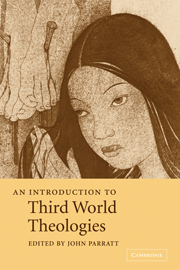Postscript
Published online by Cambridge University Press: 05 June 2012
Summary
What then is the challenge of the new approaches to Christian theology which have arisen from the Third World? Primarily, of course, as all the contributors to this volume have emphasised, they are theologies which take the context extremely seriously as a source for theology. What is new here, as Bonino points out, is that context is made quite explicit as a ground for theologising, and plays a major role in setting the theological agenda. They are also a sharp reminder that theology should essentially be communication, both to those within the Christian circle but also to those outside. This should perhaps cause us to question whether much modern theology, with its obsessive intellectualism and its over use of elitist language, has not become so introverted as to be unable to communicate itself effectively outside the circle of professionally trained theologians. One of the most remarkable things about the course of Christian theology in India was that, in its initial stages, its leaders were laymen who had no formal theological training. This did not prevent men like Chakkarai and Chenchiah producing some profound theological innovations which utilised the framework of the Hindu worldview familiar to their readers. Sundar Singh (who had very minimal seminary training, which he found of little value to him) expressed his theology in the even more popular form of parable and story. The Dalit reaction, when it came, saw even the use of Hindu forms as oppressive and alien to the experience of most Indian Christians.
- Type
- Chapter
- Information
- An Introduction to Third World Theologies , pp. 182 - 185Publisher: Cambridge University PressPrint publication year: 2004

